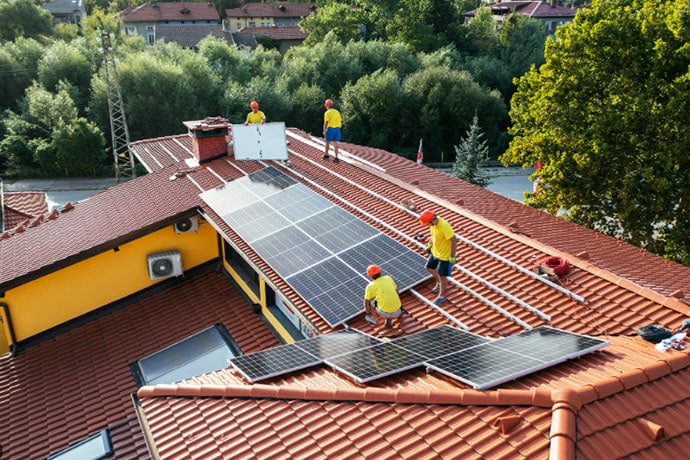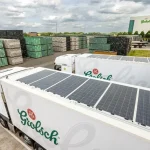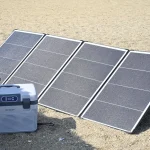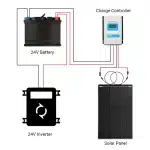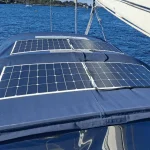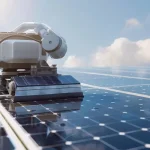Table of Contents
- Why do you need solar panels for your roof?
- What are the criteria for choosing solar panels for your roof?
- How to choose the best solar panel material?
- How to select a solar inverter?
- How do I install solar panels on my roof?
- What is the best roof angle for solar panels?
- How much roof space is needed for solar panels?
- Are rooftop solar panels safe?
- Rooftop solar panels maintenance and longevity
- Conclusion
Rooftop solar panels have emerged as a popular choice for homeowners seeking to harness the power of the sun and reduce their reliance on traditional energy sources. If you’re considering installing solar panels on your roof, it’s crucial to understand the various factors involved in the process to make an informed decision. This comprehensive buyer’s guide will provide you with valuable insights and help you navigate the world of rooftop solar panels in 2023.
Why do you need solar panels for your roof?
Solar panels offer numerous benefits for homeowners. They allow you to generate your own clean, renewable energy, reducing your carbon footprint and contributing to a greener future. By harnessing the power of the sun, solar panels can significantly reduce your electricity bills, providing long-term savings. Moreover, installing rooftop solar panels can increase the value of your home and make it more attractive to potential buyers.
What are the criteria for choosing solar panels for your roof?
When selecting solar panels for your roof, several criteria should be taken into account. Firstly, consider the efficiency of the panels, which determines the amount of electricity they can generate from the available sunlight. High-efficiency panels are more effective in converting sunlight into usable energy. Additionally, consider the durability and warranty of the panels, ensuring they can withstand various weather conditions and offer long-term performance. Lastly, take into account the aesthetics of the panels, as they will be a visible addition to your home’s exterior.
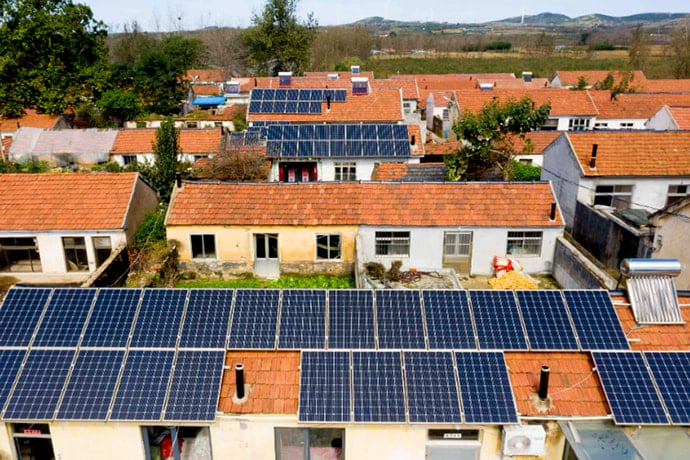
How to choose the best solar panel material?
Solar panels are primarily made from two types of materials: monocrystalline and polycrystalline silicon. Monocrystalline panels are known for their high efficiency and sleek appearance, making them a popular choice. Polycrystalline panels are slightly less efficient but generally more affordable. Consider your budget and efficiency requirements when choosing the material for your solar panels.
How to select a solar inverter?
A solar inverter is an essential component of your rooftop solar panel system. It converts the direct current (DC) electricity generated by the panels into alternating current (AC) electricity that can be used to power your home. When selecting a solar inverter, consider its efficiency, reliability, and compatibility with your solar panel system. String inverters, microinverters, and power optimizers are common types to explore, each with its advantages and considerations.
How do I install solar panels on my roof?
Solar panel installation is a complex process that should ideally be handled by professionals. They will assess your roof’s structural integrity, determine the optimal placement of the panels, and handle all electrical connections. The installation process involves mounting the panels securely on the roof, connecting them to the inverter, and integrating the system with your home’s electrical grid. Hiring a reputable solar installation company ensures a safe and efficient installation.
What is the best roof angle for solar panels?
The best roof angle for solar panels is between 30 and 45 degrees. This angle allows the solar panels to capture maximum sunlight throughout the day. However, if your roof has a different angle, it is still possible to install solar panels, but you may need to adjust the tilt of the panels to ensure maximum efficiency. In general, a roof angle that matches your latitude can maximize solar energy absorption. However, slight adjustments to the angle based on seasonal variations and specific factors can further optimize energy production. Consult with a solar professional to determine the best angle for your location.
How much roof space is needed for solar panels?
The amount of roof space required for solar panels varies depending on the size and efficiency of the panels you choose. On average, a 1-kilowatt (kW) solar panel system requires approximately 80 to 100 square feet of roof space. Consider the available roof area and the desired energy production when determining the number of panels to install.
Are rooftop solar panels safe?
Rooftop solar panels are generally safe when installed correctly and maintained properly. They undergo rigorous testing to ensure their durability and safety. However, it’s essential to follow safety guidelines during installation and maintenance. This includes hiring professional installers who are experienced in solar panel installation and familiar with local building codes. Additionally, it’s crucial to regularly inspect the panels for any damage or debris that could affect their performance or pose a safety risk. Always follow the manufacturer’s guidelines for maintenance and contact a professional if you notice any issues with your solar panel system.
Rooftop solar panels maintenance and longevity
Proper maintenance is essential to ensure the longevity and optimal performance of your rooftop solar panel system. Here are some key maintenance tips to keep in mind:
- Regular cleaning: Over time, dust, dirt, leaves, and other debris can accumulate on the surface of the solar panels, reducing their efficiency. It’s recommended to clean the panels periodically using water and a soft brush or sponge. Avoid using abrasive materials that could scratch the surface. Additionally, consider installing a self-cleaning system or hiring professional cleaning services for hard-to-reach areas or if you live in a particularly dusty or polluted environment.
- Check for shading: Shading can significantly impact the performance of your solar panels. Regularly inspect your roof and surrounding structures to ensure that there are no objects, trees, or buildings casting shadows on the panels. If shading is unavoidable, consider using microinverters or power optimizers to mitigate the impact on energy production.
- Monitor energy production: Most solar panel systems come with monitoring tools that allow you to track the energy production and performance of your system. Regularly check these metrics to identify any issues or anomalies that may require attention. If you notice a significant drop in energy production, contact a professional to assess the system and address any potential problems.
- Conduct professional inspections: It’s recommended to schedule professional inspections of your rooftop solar panel system every few years. Experienced technicians can assess the overall condition of the panels, wiring, and other components, ensuring that everything is functioning optimally and identifying any maintenance or repair needs.
- Stay informed: Keep yourself updated on the latest developments in solar panel technology and best practices for maintenance. Subscribe to industry publications, attend webinars or workshops, and engage with reputable solar energy communities to stay informed and make informed decisions about your solar panel system.
Conclusion
Investing in rooftop solar panels is a wise decision that offers numerous benefits, including reduced electricity costs, environmental sustainability, and increased property value.
Remember to consult with professionals, conduct thorough research, and seek reputable solar companies to ensure a smooth and successful transition to clean energy. Embrace the power of the sun and make a positive impact on both the environment and your finances through rooftop solar panel installation.
Article from: https://www.sungoldsolar.com/
Your most sincere solar partner – Sungold


